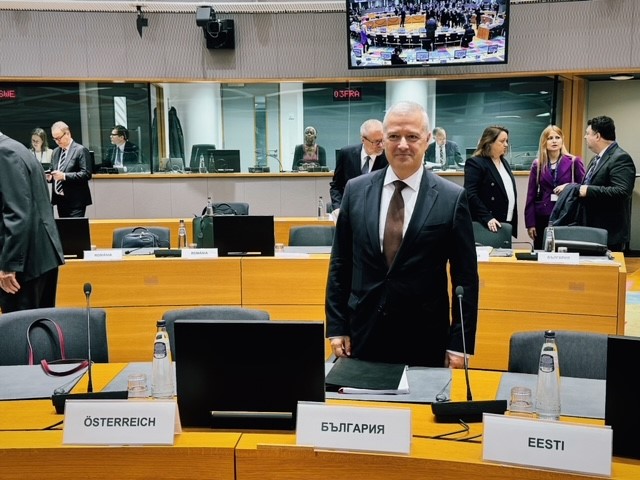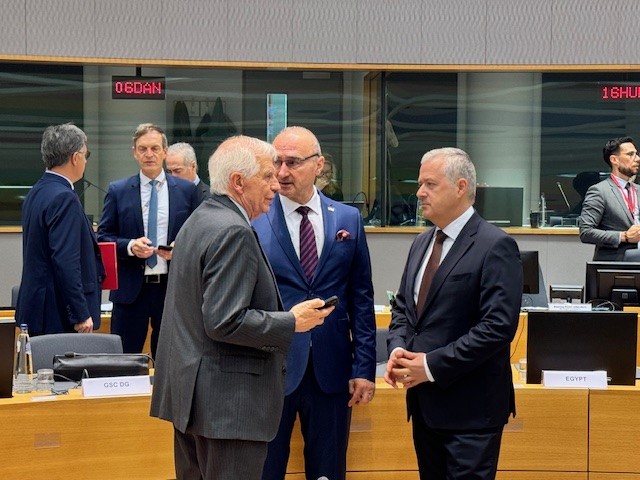EU foreign ministers held their regular monthly meeting today in Brussels
27 May 2024 News
Deputy Foreign Minister Ivan Kondov participated today in the regular monthly meeting of the EU Foreign Affairs Council in Brussels. The main topics discussed by the ministers were the Russian military aggression against Ukraine and the situation in the Middle East.
Traditionally, Ukrainian Foreign Minister Dmytro Kuleba took part in the meeting by videoconference. He briefed his counterparts on the current military situation and the need for continued military assistance to the Ukrainian armed forces. The main highlights of the discussion of the foreign ministers of the EU member states were the continuation of support for Ukraine, the use of the income from the blocked Russian assets for military support and for the reconstruction of the country, the preparation for the signing of the document with the commitments of the EU for the security of Ukraine, the adoption on the 14th package of sanctions against the Russian Federation, the new sanctions regime on the situation in Russia and the first sanctions package under this regime, countering Russia’s hybrid activities, as well as holding the Russian Federation accountable for international crimes committed in Ukraine, the preparation of the Meeting of the summit for peace in Ukraine, which will be held in Switzerland on 15—16 June 2024. ‘Support and solidarity for Ukraine in its fight against brutal Russian aggression remains a strategic priority and the EU’s joint efforts in this direction should continue’, he noted in his speech, Deputy Minister Ivan Kondov. He highlighted the need to provide additional assistance to Ukraine according to its changing needs and expressed support for the upcoming Peace Summit in Switzerland based on President Volodymyr Zelensky's Peace Formula. This is essentially a ten-point conceptual plan aimed at ending the war and achieving a comprehensive, just and lasting peace, the basis of which is the preservation of Ukraine's sovereignty and territorial integrity in accordance with international law and the UN Charter.
EU foreign ministers also discussed the situation in the Middle East. The Foreign Ministers of Egypt, Jordan, Qatar, the United Arab Emirates, Saudi Arabia and Oman, as well as the Secretary-General of the League of Arab States, also took part in this discussion. The focus of the discussion was on joint efforts to address the humanitarian situation and to resume the political process towards a two-state solution to the Middle East conflict. ‘We highly appreciate the cooperation with our Arab partners, which takes on added significance in the efforts to prevent regional escalation and outline a possible political horizon for a two-state principle solution to the conflict when the conditions are right and on the basis of an inclusive approach’, the Deputy Foreign Minister stressed. Bulgaria is deeply concerned about the deteriorating security environment in the region, which calls for urgent steps towards de-escalation, he added. The immediate and unconditional release of the hostages and the urgent tackling of the catastrophic humanitarian situation in Gaza by ensuring unimpeded access of humanitarian aid to those in need are necessary.
The Council also discussed the complex political situation in Georgia following the adoption of the controversial ‘transparency of foreign influence’ law. ‘We are convinced that Georgia's place is in our European family, as is the strong will of the Georgian population. We urge the authorities in Tbilisi to withdraw the controversial law and to actively move forward in implementing the 9 recommendations for reforms made by the EC on the country’s path towards European integration’, said Deputy Minister Ivan Kondov.
Later in the day, the Deputy Foreign Minister represented Bulgaria at the VIII Donors' Conference on Syria. The humanitarian crisis in Syria remains severe, with 16.7 million people in need of humanitarian assistance in 2024. The macroeconomic situation continues to deteriorate and 90% of Syrians live below the poverty line. The health and education systems are collapsing, there are shortages of clean drinking water, food insecurity, epidemics and serious human rights violations, with women and girls disproportionately affected by various forms of violence. The commitment of the EU and the international community to continue supporting the Syrian people has been renewed.

